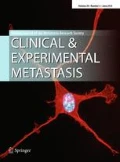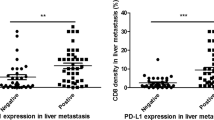Abstract
p53 overexpression occurs in more than 50% of colorectal carcinomas, which makes it an interesting target for immunotherapy. HLA class I expression on tumor cells is required for the presentation of p53 peptides and an effective T-cell mediated-immune response to ensue. To analyze to which extent p53 and HLA-I expression in a primary tumor reflects expression in liver metastases, we investigated p53, HLA-A and HLA-B/C expression in 82 colorectal carcinomas and 143 associated liver metastases of 82 patients. We used the monoclonal antibodies DO-7 (p53), HCA2 (HLA-A) and HC-10 (HLA-B/C) on formalin-fixed, paraffin embedded tissue. The percentage of expressing cells was estimated. P53 was overexpressed in 73% of the colorectal carcinomas and 66% of liver metastases. HLA-A was expressed in 98% and 96% and HLA-B/C in 100% and 94% of colorectal cancers and liver metastases respectively. There were no significant differences between the primary tumors and the liver metastases for each marker. The concordance was also very high in those cases in which more than one metastasis was available. Discordant cases consisted of tumors in which expression of p53 or HLA-A was lost in the liver metastases, whereas it was present in only a few tumor cells in the primary tumor. The combined analysis of p53 and HLA-I expression in liver metastases demonstrated that both molecules were expressed in 63% of the cases. P53 and HLA-I were expressed in the majority of primary tumors and their associated liver metastases. This allows to select patients for p53-immunotherapy on the basis of p53 and HLA-I expression in the primary tumor.
Similar content being viewed by others
References
Parkin DM, Bray F, Ferlay J, Pisani P. Estimating the world cancer burden: Globocan 2000. Int J Cancer 2001; 94(2): 153–6.
Stangl R, Altendorf Hofmann A, Charnley RM, Scheele J. Factors influencing the natural history of colorectal liver metastases. Lancet 1994; 343(8910): 1405–10.
Sargent DJ, Niedzwiecki D, O'Connell MJ, Schilsky RL. Recommendation for caution with irinotecan, fluorouracil, and leucovorin for colorectal cancer. N Engl J Med 2001; 345(2): 144–5.
Best L, Davis C, Fentiman I et al. Palliative chemotherapy for advanced or metastatic colorectal cancer (Cochrane Review). The Cochrane Library Issue 4, 2000. Oxford: Update Software.
Vermorken JB, Claessen AM, van Tinteren H et al. Active specific immunotherapy for stage II and stage III human colon cancer: A randomised trial. Lancet 1999; 353(9150): 345–50.
Riethmuller G, Schneider Gadicke E, Schlimok G et al. Randomised trial of monoclonal antibody for adjuvant therapy of resected Dukes' C colorectal carcinoma. German Cancer Aid 17-1A Study Group. Lancet 1994; 343(8907): 1177–83.
Moertel CG, Fleming TR, Macdonald JS et al. Levamisole and fluorouracil for adjuvant therapy of resected colon carcinoma. N Engl J Med 1990; 322(6): 352–8.
Henderson RA, F inn OJ. Human tumor antigens are ready to fly. Adv Immunol 1996; 62: 217–56.
Tollenaar RA, van Krieken JH, van Slooten HJ et al. Immunohistochemical detection of p53 and Bcl-2 in colorectal carcinoma: no evidence for prognostic significance. Br J Cancer 1998; 77(11): 1842–47.
Hollstein M, Sidransky D, Vogelstein B, Harris CC. p53 mutations in human cancers. Science 1991; 253(5015): 49–53.
Roth J, Dittmer D, Rea D et al. p53 as a target for cancer vaccines: recombinant canarypox virus vectors expressing p53 protect mice against lethal tumor cell challenge. Proc Natl Acad Sci USA 1996; 93(10): 4781–4786.
Vierboom MP, Nijman HW, Offringa R et al. Tumor eradication by wild-type p53-specific cytotoxic T lymphocytes. J ExpMed 1997; 186(5): 695–704.
De Jong KP, Stellema R, Karrenbeld A et al. Clinical relevance of transforming growth factor alpha, epidermal growth factor receptor, p53, and Ki67 in colorectal liver metastases and corresponding primary tumors. Hepatology 1998; 28(4): 971–9.
Yang JL, Ow KT, Russell PJ et al. Higher expression of oncoproteins c-myc, c-erb B-2/neu, PCNA, and p53 in metastasizing colorectal cancer than in nonmetastasizing tumors. Ann Surg Oncol 1996; 3(6): 574–9.
Yao J, Goh HS, Smith DR. p53 mutations in primary colorectal adenocarcinomas and liver metastases. Br J Surg 1996; 83(9): 1245–6.
Kastrinakis WV, Ramchurren N, Rieger KM et al. Increased incidence of p53 mutations is associated with hepatic metastasis in colorectal neoplastic progression. Oncogene 1995; 11(4): 647–52.
Costa A, Doci R, Mochen C et al. Cell proliferation-related markers in colorectal liver metastases: correlation with patient prognosis. J Clin Oncol 1997; 15(5): 2008–14.
Tullo A, D'Erchia AM, Honda K et al. Characterization of p53 mutations in colorectal liver metastases and correlation with clinical parameters. Clin Cancer Res 1999; 5(11): 3523–3528.
Heisterkamp J, van Bommel J, Hop WC et al. P53 overexpression in colorectal metastases confined to the liver and outcome of liver resection. Hepatogastroenterology 1999; 46(30): 3109–14.
Moller P, Koretz K, Schlag P, Momburg F. Frequency of abnormal expression of HLA-A,B,C and HLA-DR molecules, invariant chain, and LFA-3 (CD58) in colorectal carcinoma and its impact on tumor recurrence. Int J Cancer Suppl 1991; 6: 155–62.
Momburg F, Degener T, Bacchus E et al. Loss of HLA-A,B,C and de novo expression of HLA-D in colorectal cancer. Int J Cancer 1986; 37(2): 179–84.
McDougall CJ, Ngoi SS, Goldman IS et al. Reduced expression of HLA class I and II antigens in colon cancer. Cancer Res 1990; 50(24): 8023–7.
Cordon CC, Fuks Z, Drobnjak M et al. Expression of HLA-A,B,C antigens on primary and metastatic tumor cell populations of human carcinomas. Cancer Res 1991; 51(23, Pt 1): 6372–80.
Ruiz CF, Lopez-Nevot MA, Gutierrez J et al. Phenotypic expression of histocompatibility antigens in human primary tumours and metastases. Clin Exp Metastasis 1989; 7(2): 213–26.
Lopez-Nevot MA, Esteban F, Ferron A et al. HLA class I gene expression on human primary tumours and autologous metastases: demonstration of selective losses of HLA antigens on colorectal, gastric and laryngeal carcinomas. Br J Cancer 1989; 59(2): 221–6.
Beahrs OH, Henson DE, Putter RPV, Kennedy BJ. Manual for Staging Cancer, 4th edition. Philadelphia, Pennsylvania: J.B. Lippincott Company, 1992; 75–79.
Stam NJ, Vroom TM, Peters PJ et al. HLA-A-and HLA-B-specific monoclonal antibodies reactive with free heavy chains in western blots, in formalin-fixed, paraffin-embedded tissue sections and in cryo-immuno-electron microscopy. Int Immunol 1990; 2(2): 113–25.
Belluco C, Guillem JG, Kemeny N et al. p53 nuclear protein overexpression in colorectal cancer: A dominant predictor of survival in patients with advanced hepatic metastases. J Clin Oncol 1996; 14(10): 2696–701.
Yang Y, Forslund A, Remotti H et al. P53 mutations in primary tumors and subsequent liver metastases are related to survival in patients with colorectal carcinoma who undergo liver resection. Cancer 2001; 91(4): 727–36.
Bonsing BA, Corver WE, Gorsira MC et al. Specificity of seven monoclonal antibodies against p53 evaluated with Western blotting, immunohistochemistry, confocal laser scanning microscopy, and flow cytometry. Cytometry 1997; 28(1): 11–24.
Karre K. Express yourself or die: peptides, MHC molecules, and NK cells. Science 1995; 267(5200): 978–9.
Moller P, Momburg F, Koretz K et al. Influence of major histocompatibility complex class I and II antigens on survival in colorectal carcinoma. Cancer Res 1991; 51(2): 729–36.
Jager MJ, Hurks HM, Levitskaya J, Kiessling R. HLA expression in uveal melanoma: There is no rule without some exception. Hum Immunol 2002; 63(6): 444–51.
Menon AG, Morreau H, Tollenaar RA et al. Down-Regulation of HLA-A Expression Correlates with a Better Prognosis in Colorectal Cancer Patients. Lab Invest 2002; 82(12): 1725–33.
van der Burg SH, Menon AG, Redeker A et al. Induction of p53-specific Immune Responses in Colorectal Cancer Patients Receiving a Recombinant ALVAC-p53 Candidate Vaccine. Clin Cancer Res 2002; 8(5): 1019–27.
Author information
Authors and Affiliations
Corresponding author
Rights and permissions
About this article
Cite this article
Menon, A.G., Tollenaar, R.A., van de Velde, C.J. et al. p53 and HLA class-I expression are not down-regulated in colorectal cancer liver metastases. Clin Exp Metastasis 21, 79–85 (2004). https://doi.org/10.1023/B:CLIN.0000017206.08931.42
Issue Date:
DOI: https://doi.org/10.1023/B:CLIN.0000017206.08931.42




